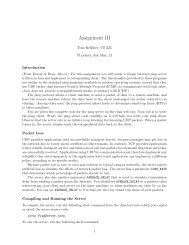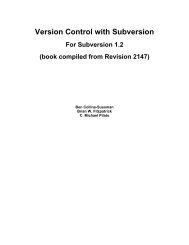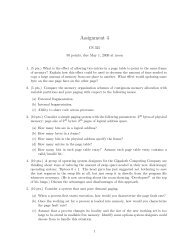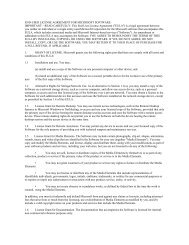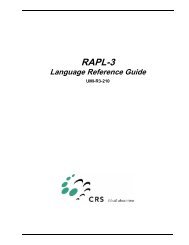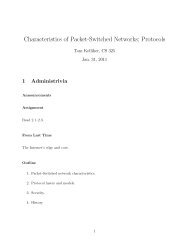Flesh and Machines - Phoenix Goucher
Flesh and Machines - Phoenix Goucher
Flesh and Machines - Phoenix Goucher
You also want an ePaper? Increase the reach of your titles
YUMPU automatically turns print PDFs into web optimized ePapers that Google loves.
Specialness<br />
Over the last four thous<strong>and</strong> years mankind has undergone some very large changes in worldview. Perhaps the issue<br />
of whether robots can have emotions, even in principle, let alone now, will be the topic of another change in<br />
worldview.<br />
Human thought <strong>and</strong> intellectual discourse over the last five hundred years has been a history of changing<br />
underst<strong>and</strong>ing of mankind's place <strong>and</strong> role in the universe. Early on, the existence of a god, or gods, was postulated<br />
to explain the inexplicable. This mechanism has been very common across all human cultures. The details of the<br />
form of the gods have varied. There have been all-powerful single deities, <strong>and</strong> panoplies of flawed humanlike actors,<br />
<strong>and</strong> spirits that are at the edge of our underst<strong>and</strong>ing. But all these gods have had wills of their own, <strong>and</strong> have done<br />
things for their own reason, which is beyond our reason. We have been saved the need to explain everything in the<br />
universe. It has been beyond our place in the universe to underst<strong>and</strong> or question the details. Religions have provided<br />
comfort where faith <strong>and</strong> a limit on questioning replaces the terrible unknown, the gnawing lack of underst<strong>and</strong>ing.<br />
Mysticism is comforting to us in the way it releases us from having to search further. It provides a satisfaction <strong>and</strong><br />
an ease. It utilizes those early parts of the brain that are devoted to emotions <strong>and</strong> sends signals of contentment<br />
throughout our brain making us feel good.<br />
In case you are explicitly religious <strong>and</strong> feel that your beliefs are being attacked by these remarks, you might perhaps<br />
reflect that they need only apply to all those other people throughout history who have worshiped other gods. Their<br />
beliefs <strong>and</strong> yours are not consistent, <strong>and</strong> so they must ultimately be mistaken. My remarks need only apply to why<br />
they are so committed to their incorrect beliefs.<br />
And in case you are an atheist, let me remind you that you most probably have similar deep-seated beliefs, which<br />
while not openly religious share many of the same dogmatic aspects of religion. These beliefs might include faith in<br />
rationalism, science, bionomics, extropianism, or technofuturism. All of these also trigger the same sorts of<br />
satisfaction in that they provide a belief system that does not need to be questioned. They provide a place of<br />
contentment for our brains where we do not need to desperately search for answers, where we are not triggering the<br />
same responses that enabled us to think quickly <strong>and</strong> survive dangers on the savanna.<br />
My point here is that all of us, myself included, have our own sets of deep-seated beliefs that we prefer to keep as<br />
beliefs. Our usual reaction to having them challenged is anger—a primitive fight response. Our emotional systems<br />
kick in <strong>and</strong> provoke us to try to eliminate the danger through the quickest means possible. We generally do not savor<br />
the feelings of internal conflict that thinking about our deepest-held beliefs brings upon us.<br />
Over the last five hundred years, however, mankind as a species has been confronted again <strong>and</strong> again with<br />
challenges to our most deeply held beliefs. We have had to go through multistage processes at each of these<br />
challenges <strong>and</strong> find ways to reconcile new underst<strong>and</strong>ings of the universe with what we have already believed.<br />
These confrontations have always been emotional, <strong>and</strong> often they have been violent. They have taken tens to<br />
hundreds of years to become accepted as general truths, to become assimilated into the belief systems that we all<br />
hold <strong>and</strong> that provide us with the comfort levels that let us reach a state of equilibrium in our brain chemistry.<br />
The natural <strong>and</strong> prescientific view that human cultures all seem to have adopted is that the Earth is the center of the<br />
universe, with the Sun, Moon, <strong>and</strong> stars revolving around it. As scientific observations were taken, this view was<br />
challenged. In the sixteenth century Copernicus suggested a heliocentric universe, with the Earth revolving around<br />
it.Later that century Tycho Brahe, with his reams of meticulous data, worked on showing that the planets circled the<br />
Sun but was not ready to give up the Earth as the center of the universe. Kepler, early in the seventeenth century,<br />
armed with Brahe's data, was able to break out of the belief in the simplicity of circles <strong>and</strong> show that the planets<br />
moved in elliptical orbits. The heliocentric universe by this time was an idea that was in the air, <strong>and</strong> discussed, but it<br />
came to a head in just a few years with Galileo. He was the first to turn a telescope to the sky, early in the<br />
seventeenth century, <strong>and</strong> before long the essential truth of the Sun as the center of our solar system become evident<br />
to him. This was not acceptable to the Catholic Church, <strong>and</strong> Galileo prudently chose the path of repentance rather<br />
than sticking with his truth.<br />
The church could not accept that the terra firma on which mankind stood could not be the center of the universe. It<br />
had to be. For otherwise, why had God placed us somewhere peripheral? How could God, who had created men, for<br />
whatever reason, as the embodied masters of the universe, not place them centrally? Mankind was special.<br />
Specialness dem<strong>and</strong>ed a central place in the universe. Heaven was above. Hell below. The center of action was the



